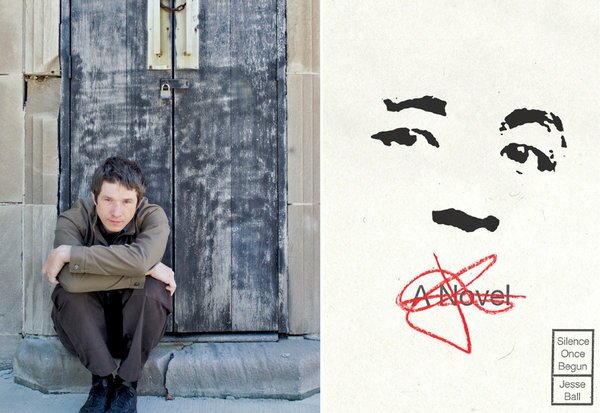Sunday, May 18, 2014
The Worst Injustice in "Silence Once Begun" by Jesse Ball ...
The worst injustice in Jesse Ball's new novel "Silence Once Begun" is the description inside the front dust jacket! It reduces what I consider to be an achingly beautiful work to a banal page turner whodunit. Ack. Ugh. The author bio in the back dusk jacket cover, however, is brilliant: In addition to the various awards, "[Jesse Ball] gives classes on lucid dreaming and lying at the School of the Art Institute of Chicago."
The ideas and principles in this novel are greater than people and concrete reality; the former supersedes and trumps the latter again and again. The ideas of Sato Kakuzu are executed perfectly (and in his mind are perfectly justified) even though they result in the execution of an innocent Oda Sotatsu - the taking of an actual human life to express an abstract idea and make a point about principles. Real life is less important than abstraction here, though it is still treasured. The system they live in has the same flaws. The erstwhile activist's girlfriend Jito Joo and later Oda's true love is herself incapable of intervening to stop the tragedy based on principles she, too, ultimately clings to more tightly than the love of her life, a love to transcend even time and place and life itself. Oda is incapable of trying to even defend his innocence, trapped or perhaps liberated (depending on your viewpoint) by his own beliefs and principles.
I suppose some of this could be said to be a reflection of Japanese culture and it certainly feels that way based upon my past reading and experiences. I certainly found myself enjoying the balance between Japanese thought and social patterns wonderfully expressed here in tension with the author's and persona's Western outlook and style.
A favorite aspect of this work for me was both the unreliable narrator effect across many characters, much like in Michael Haneke's stunning movie "White Ribbon" and of course the overly-referred to Japanese classic Rashomon (this is indeed Rashomon on steriods!) as well as the intensely poetic feel and imagery invoking separation, space and action happening at a distance, barely seen and felt in the moment. There is a theme of viewing people silently through windows and glass, and the thin wheel with spokes turning in the distance while key dynamics unfold is such a fantastic image and invokes an unsettling sense of an elusive remote fulcrum of change in the relationships between people.
This novel initially struck me as potentially tedious when I perused the description and saw that there were transcripts of interviews and testimony. But he leads with a narrative punch and never lets up and yet what I like most of all is that the further you fall down Ball's compelling rabbit hole, the more you feel this work growing increasingly profound and hauntingly lovely and loving, with poetic climax found in the significant letters the characters write or the key testimony they give late in the book.
One of my favorite poems of all time is James Wright's "Jewel" ...
There is this cave
In the air behind my body
That nobody is going to touch:
A cloister, a silence
Closing around a blossom of fire.
When I stand upright in the wind,
My bones turn to dark emeralds.
And for some reason I was reminded of that in this intriguing and poignant bit from the letter Oda writes:
Where the house met the back gate, I used to hide things. You never knew that. Mother, Jiro, no one ever knew it. There is a hollow spot there, and I would put a thing there now and then. This is the kind of feeling I have now. I wanted you to know that I am not worrying any more. I am not worrying now."
Subscribe to:
Post Comments (Atom)


No comments:
Post a Comment